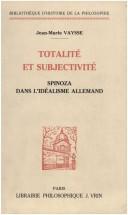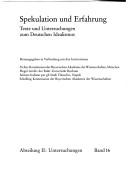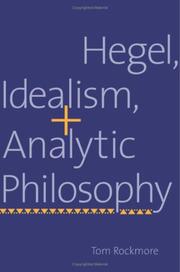| Listing 1 - 10 of 14 | << page >> |
Sort by
|
Book
ISBN: 9783772826122 3772826121 Year: 2013 Volume: 57 Publisher: Stuttgart (Bad Cannstatt) Frommann-Holzboog
Abstract | Keywords | Export | Availability | Bookmark
 Loading...
Loading...Choose an application
- Reference Manager
- EndNote
- RefWorks (Direct export to RefWorks)
Philosophy, German --- Idealism, German --- Philosophy, Modern --- History --- Philosophy, German - 18th century --- Philosophy, German - 19th century --- Idealism, German - History
Book
ISBN: 3608913602 9783608913606 Year: 1991 Publisher: Stuttgart Klett-Cotta
Abstract | Keywords | Export | Availability | Bookmark
 Loading...
Loading...Choose an application
- Reference Manager
- EndNote
- RefWorks (Direct export to RefWorks)
Idealism, German --- Philosophy, German --- History --- -Philosophy, German --- -German philosophy --- German idealism --- -Idealism, German --- -History --- Idealism, German - History - 18th century. --- Philosophy, German - 18th century.

ISSN: 02497980 ISBN: 2711612015 9782711612017 Year: 2002 Publisher: Paris : Librairie J. Vrin,
Abstract | Keywords | Export | Availability | Bookmark
 Loading...
Loading...Choose an application
- Reference Manager
- EndNote
- RefWorks (Direct export to RefWorks)
Idealism, German --- -Idealism, German --- -Pantheism --- Philosophy, German --- -Philosophy, German --- -German philosophy --- Philosophy --- Religion --- Panentheism --- German idealism --- History --- -History --- -Spinoza, Benedictus de --- -Influence --- Philosophie allemande --- Idéalisme allemand --- Spinoza, Benedictus de, --- Influence --- Influence. --- Ispīnūzā, --- Spinoza, Baruch, --- Espinoza, Baruch d', --- Sbīnūzā, --- Espinosa, Baruch de, --- De Spinoza, Benedictus, --- Shpinozah, --- Shpinozah, Barukh, --- Spinoza, Benedict de, --- Spinoza, Barukh, --- Spinoza, Baruch de, --- Spinoza, Benoît de, --- ספינאזא, ברוך דע --- ספינאזא, ברוך, --- שפימוזה, ברוך --- שפינאזא, בענעדיקט --- שפינאזא, ברוך --- שפינאזע, ברוך --- שפינוזא, בנדיקטוס --- שפינוזהת ברוך, --- שפינוזה, ברוך --- שפינוזה, ברוך די, --- שפינוזה, ברוך, --- שפינוזה, ב. --- سبينوزا، بندكتس --- de Spinoza, Benedictus --- Idealism, German - History - 18th century. --- Idealism, German - History - 19th century. --- Spinoza, Benedictus de --- Spinoza, Baruch --- Spinoza, Benedict de

ISBN: 3772811744 9783772811746 Year: 1990 Volume: 16 Publisher: Stuttgart Frommann-Holzboog
Abstract | Keywords | Export | Availability | Bookmark
 Loading...
Loading...Choose an application
- Reference Manager
- EndNote
- RefWorks (Direct export to RefWorks)
Idealism, German --- Idéalisme allemand --- History --- Histoire --- Maimon, Salomon, --- 1 MAIMON, SALOMON --- -German idealism --- Filosofie. Psychologie--MAIMON, SALOMON --- -Maimon, Salomon --- -Filosofie. Psychologie--MAIMON, SALOMON --- 1 MAIMON, SALOMON Filosofie. Psychologie--MAIMON, SALOMON --- Idéalisme allemand --- German idealism --- Maimon, Solomon --- Maimon, Salomon --- Idealism, German - History - 18th century.
Book
ISBN: 9782271076175 227107617X 2271076315 2271084482 2271142202 Year: 2013 Publisher: Paris : CNRS,
Abstract | Keywords | Export | Availability | Bookmark
 Loading...
Loading...Choose an application
- Reference Manager
- EndNote
- RefWorks (Direct export to RefWorks)
Notion équivoque et polémique, l’idéalisme a souvent été assimilé à une posture intellectuelle abstraite, oublieuse de son ancrage naturel et social. Dénoncée par Marx et Nietzsche, cette notion fut centrale pour la philosophie classique allemande, en particulier Hegel. Explicitement assumée, revendiquée même, elle désigne l’orientation spéculative fondamentale du hégélianisme, mais aussi toute philosophie qui s’engage avec cohérence dans une démarche théorique : « Toute vraie philosophie est un idéalisme », affirme Hegel. Faisant ressortir l’originalité radicale de la conception hégélienne de l’idéalisme, Olivier Tinland confronte cet engagement philosophique aux doctrines majeures de la modernité, de la métaphysique rationaliste et de l’empirisme moderne jusqu’aux différentes incarnations de l’idéalisme allemand (Kant, Fichte, Schelling). Cette confrontation aux pensées majeures de la modernité sert de toile de fond à l’explicitation progressive de la démarche philosophique de Hegel, dont l’ambition est ainsi approchée au plus près : moyennant le dévoilement de l’idéalité du réel, rendre compte, d’un même geste, du statut de la réalité, de la manière dont nous nous rapportons à elle et du mode de validation spécifique du discours philosophique. Plus largement, cet ouvrage invite à se demander dans quelle mesure la stratégie spéculative de Hegel trouve un écho dans les débats métaphysiques et épistémologiques contemporains sur la vérité, l’expérience, l’objectivité ou le réalisme.
Idéalisme (philosophie) --- Idealism, German --- Idéalisme allemand --- Hegel, Georg Wilhelm Friedrich, --- Philosophy --- History --- Idéalisme (philosophie) --- Idéalisme allemand --- Idealism, German - History --- Philosophy - Germany - History --- Hegel, Georg Wilhelm Friedrich, - 1770-1831 --- Hegel, Georg Wilhelm Friedrich, 1770-1831 --- Philosophy & Religion --- vérité --- Kant --- Hegel --- réalité --- idéalisme allemand
Book
ISBN: 3884792695 9783884792698 Year: 1987 Publisher: Würzburg Königshausen und Neumann
Abstract | Keywords | Export | Availability | Bookmark
 Loading...
Loading...Choose an application
- Reference Manager
- EndNote
- RefWorks (Direct export to RefWorks)
Philosophie allemande --- --XVIIIe-XIXe s., --- Critique --- --Idéalisme allemand --- --1794-1804 --- --Idealism, German --- History --- Fichte, Johann Gottlieb, --- 1 FICHTE, JOHANN GOTTLIEB --- 141.13 --- Filosofie. Psychologie--FICHTE, JOHANN GOTTLIEB --- Metafysisch idealisme --- 1 FICHTE, JOHANN GOTTLIEB Filosofie. Psychologie--FICHTE, JOHANN GOTTLIEB --- 141.13 Metafysisch idealisme --- XVIIIe-XIXe s., 1701-1900 --- Idéalisme allemand --- Idealism, German - History --- Fichte, Johann Gottlieb, - 1762-1814 --- Idealism, German

ISBN: 0300104502 9780300104509 Year: 2005 Publisher: New Haven, Conn. Yale University Press
Abstract | Keywords | Export | Availability | Bookmark
 Loading...
Loading...Choose an application
- Reference Manager
- EndNote
- RefWorks (Direct export to RefWorks)
Idealism, German --- Analysis (Philosophy) --- Philosophy, German --- History --- Hegel, Georg Wilhelm Friedrich, --- Hegel, Georg W.F. --- Hegel, Georg Wilhelm Friedrich --- Idealism [German ] --- 19th century --- Philosophy [German ] --- Idealism, German - History - 19th century --- Analysis (Philosophy) - History - 19th century --- Philosophy, German - 19th century --- Hegel, Georg Wilhelm Friedrich, - 1770-1831
Book
ISSN: 12485284 ISBN: 2271064791 9782271064790 2271141966 Year: 2022 Publisher: Paris : CNRS Éditions,
Abstract | Keywords | Export | Availability | Bookmark
 Loading...
Loading...Choose an application
- Reference Manager
- EndNote
- RefWorks (Direct export to RefWorks)
Si la philosophie vise bien une vérité, elle ne peut être indifférente à sa communication. Le vrai doit être dit pour tous, car il vaut pour tous. Telle est la conviction des siècles démocratiques, héritiers des idéaux des Lumières. Mais comment être assuré qu’il sera compris ? Les études ici réunies, consacrées aux Lumières et à l’ensemble romantique et idéaliste allemand, présentent plusieurs tentatives et reviennent sur leurs apories. Dans la lignée d’un rationalisme triomphant, les Lumières ont cherché à « populariser » la philosophie, privilégiant la clarté du discours. Mais cette pédagogie rencontre une double limite, qui tient à la simplification des contenus et à l’impossibilité d’éviter tout malentendu. En réaction aux illusions d’une communication accomplie sous le signe de la raison universelle, des stratégies alternatives ont vu le jour. De Kant à Fichte, de Hegel à Schlegel, Schelling ou Schleiermacher, les formes les plus diverses ont pu être essayées, trahissant la tension entre l’individualité de la forme et l’universalité de la prétention au vrai. On analysera ici le poème didactique, le fragment, le dialogue et le récit à partir de cas exemplaires où la philosophie s’approprie des genres hétérogènes comme le poème de Lucrèce, la maxime des moralistes français, le dialogue platonicien ou l’épopée homérique. Entre le désir de science et la tentation de la littérature, la philosophie a exploré, des Lumières au romantisme, de multiples voies pour assurer sa communication. Réfléchissant sur les apories d’une pédagogie de la clarté autant que d’une réduction de la philosophie à l’écriture, l’ouvrage plaide pour un pluralisme des formes qui engage l’activité du lecteur.
Enlightenment. --- Idealism, German --- Philosophy, German --- Siècle des lumières --- Idéalisme allemand --- Philosophie allemande --- History --- Histoire --- Enlightenment --- Philosophy --- Enlightenment - Germany --- Idealism, German - History - 18th century --- Philosophy - Germany - History - 18th century --- Philosophy, German - 18th century --- philosophie --- partage --- idée --- Mouvement des Lumières --- Idéalisme allemand --- Forme (philosophie) --- Écriture --- Philosophie
Book
ISBN: 9781786609182 9781786609175 1786609177 1786609185 Year: 2018 Publisher: London Rowman & Littlefield
Abstract | Keywords | Export | Availability | Bookmark
 Loading...
Loading...Choose an application
- Reference Manager
- EndNote
- RefWorks (Direct export to RefWorks)
This book provides an account of the development of ideas about nature from the Early German Romantics into the philosophies of nature of Schelling and Hegel. In clear and accessible language, Alison Stone explains how the project of philosophy of nature took shape and made sense in the post-Kantian context. She also shows how ideas of nature were central to the philosophical and literary projects of the Early German Romantics, with attention to Friedrich Schlegel, Novalis and Hölderlin. Stone advances a distinctive, original perspective on Romantic and Idealist accounts of nature and their ethical implications regarding human-nature relations and intra-human political relations, especially but not only around gender and race. The book demonstrates how these approaches to nature have contemporary relevance to a range of current debates such as those over naturalism, the environmental crisis, and the politics of gender, race and colonialism.
Novalis --- Hegel, Georg W.F. --- Schelling, von, Friedrich W.J. --- Schlegel, Friedrich --- Hölderlin, Friedrich --- anno 1700-1799 --- anno 1800-1899 --- Germany --- Philosophy of nature --- Romanticism --- Idealism, German --- History --- Hegel, Georg Wilhelm Friedrich, --- Philosophy of nature - Germany - History --- Romanticism - Germany --- Idealism, German - History --- Hegel, Georg Wilhelm Friedrich, - 1770-1831 --- Ethics --- Philosophy --- Gender --- Nature --- Book --- Sex differences
Book
ISBN: 3465028902 3465028910 9783465028918 Year: 1997 Volume: 28 28 Publisher: Frankfurt am Main Klostermann
Abstract | Keywords | Export | Availability | Bookmark
 Loading...
Loading...Choose an application
- Reference Manager
- EndNote
- RefWorks (Direct export to RefWorks)
History of philosophy --- Hegel, Georg W.F. --- Schelling, von, Friedrich W.J. --- Fichte, Johann Gottlieb --- Philosophy, Modern --- Idealism, German --- Philosophie --- Idéalisme allemand --- Heidegger, Martin, --- Fichte, Johann Gottlieb, --- Schelling, Friedrich Wilhelm Joseph von, --- Hegel, Georg Wilhelm Friedrich, --- History. --- Idéalisme allemand --- Schelling, Friedrich Wilhelm Joseph von --- Schelling, F. W. J. --- Schelling, Friedrich Wilhelm Joseph --- Schelling, Federico Guillermo José --- Hegel, Giorgio Guglielmo Frederico --- Hegel, Georg Wilhelm Friedrich --- Hegel, Georg Wilhelm Friedrich. --- von Schelling, Friedrich Wilhelm Joseph --- Hēgeru, --- Hei-ko-erh, --- Gegelʹ, Georg, --- Hījil, --- Khegel, --- Hegel, G. W. F. --- Hegel, --- Hei Ge Er, --- Chenkel, --- Hīghil, --- הגל, --- הגל, גאורג וילהלם פרידריך, --- הגל, גיאורג וילהלם פרידריך, --- הגל, ג.ו.פ, --- היגל, גורג ווילהלם פרדריך, --- היגל, גיורג וילהלם פרידריך, --- 黑格尔, --- Hegel, Guillermo Federico, --- Hegel, Jorge Guillermo Federico, --- Heyel, Georg Wilhelm Friedrich, --- Higil, Gʼūrg Vīlhim Frīdrīsh, --- هگل, --- هگل، گئورگ ويلهم فريدريش, --- Idealism, German - History. --- Philosophy, Modern - 20th century.
| Listing 1 - 10 of 14 | << page >> |
Sort by
|

 Search
Search Feedback
Feedback About UniCat
About UniCat  Help
Help News
News